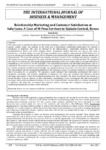| dc.description.abstract | This study sought to establish the effects of relationship marketing on customer satisfaction: a case of M-pesa Services in
Kajiado Central, Kenya. The objective of the study was to determinant relationship establishment on customer
Satisfaction in Safaricom. The study an informed by the following theory: relationship marketing theory, the
commitment-trust theory and social exchange theory. Quantitative method approach was used in this study.
Furthermore, correlation design was used. The target population was confined to approximately 20,000 M-Pesa users
from six selected areas in Kajiado Central. The six clustered areas included: Eiti, Esukuta, Hospital, Majengo, Market and
Olopurupurana. The researcher employed two sampling techniques namely: cluster sampling and purposive sampling.
The Sample size was 140 respondents. The study used self-administered questionnaires to collect the data. The validity of
the research instruments was determined through expert knowledge in this area. A pilot study of ten respondents from
Ongata Rongai was carried to test the reliability of the instruments.Descriptive and inferential statistics were used to
analyse data. The research outcome revealed that there was a significant and positive effect of relationship establishment
on customer satisfaction in Safaricom and the effect was significant because the p-value is less than the set value of 0.05.
The study deduced that the relationship establishment had explanatory power on customer satisfaction in Safaricom in
that it accounted for its variability. The regression results indicated that relationship development had overall
significant relationship with customer satisfaction in Safaricom. The study also concluded that Safaricom should
encourage their agents to have relationship development with their customers. The study recommends that Safaricom
should therefore, strive to improve on their relationship establishment. It also recommends that Safaricom should
encourage relationship development techniques because this study established a positive effect on customer satisfaction
in Safaricom. The study also recommends that Safaricom need to encourage their employees and agents to have
relationship maintenance activities in their operations. | en_US |

